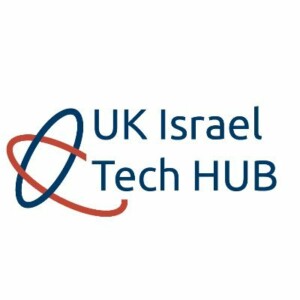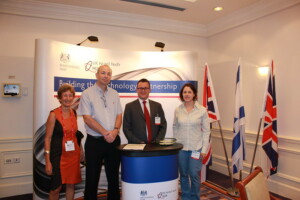The UK Israel Tech Hub: Fast-Tracking Israeli Tech Companies into the NHS

With deep links to Israeli military and intelligence services, the UK Israel Tech Hub is a UK government initiative that claims to open doors between the Israeli and UK markets. Public funds are enabling Israeli technology firms to be fast-tracked into the NHS, and we think Boycott, Divestment, Sanctions (BDS) campaigners ought to know about it.
During this investigation, we found:
- The UK Israel Tech Hub aims to give Israeli tech firms access to the UK market via a service operated from the British embassy in Tel Aviv.
- Since 2011, the Hub has been chaired by Haim Shani, who was until recently a director at Cellebrite – the Israeli intelligence company involved in international hacking scandals.
- Idan Fisher, a former director at the Hub, also has links to the Israeli military via companies making drones used to terrorise Palestinians.
- Matthew Gould, former NHSX CEO, oversaw the Hub’s foundation. He was key to Palantir getting contracts in the NHS.
- At least one initiative between the Hub and the NHS clearly stated its aim to push back on BDS activism in the UK.
The Technology of Occupation and Genocide
Over the last 12 months, we have become all too aware of the dystopian uses of new technologies as they have been indiscriminately ‘tested’ on Palestinians in the ongoing genocide in Gaza. Global and Israeli tech firms have joined forces with Israel’s military and intelligence services to further develop deadly collaborations on weapons and surveillance tech.
Already a world leader in surveillance technologies, Israel’s tech sector counts for nearly half of all the country’s exports and for 18% of its GDP, with two key areas being cybersecurity and the health sector. Israeli organisation, Startup Nation, found health to be the largest field by company count (1600+ active companies) by late 2023. However, cybersecurity represented the sector receiving the most funding overall, in a trend that was projected to continue into 2024. Artificial Intelligence (AI) was also reported as an area to watch.
Israel’s tech startups have been inextricably linked to its often-covert intelligence operations, with estimates of over 1000 companies having been founded by former Unit 8200 personnel – the largest of Israel’s infamous and highly secretive military units known for its focus on surveillance technology. One ex-commander even approximated that 90% of the country’s intelligence material comes from Unit 8200. Former members of the mysterious intelligence unit have founded, amongst others, the cyber division of Elbit Systems; cloud-based web development platform Wix; and messaging app Viber.
The UK Israel Tech Hub
Tech workers have raised awareness and put pressure on employers to cut contracts with Israel, with campaigners globally having claimed some recent successes in the growing BDS movement. For those closer to home, it’s important not to overlook the substantial presence of Israeli companies in the NHS – the largest public sector workforce, and therefore collective workplace, in the UK.
The 2023 UK government paper, 2030 roadmap for UK-Israel bilateral relations, stated that one in every seven medicines in the health service comes from Israel. There is also a growing presence of Israeli tech companies in the NHS, and the report stated that 250 partnerships have been facilitated by the publicly‐funded UK Israel Tech Hub, based at the British Embassy in Tel Aviv. It is by far the longest running of all the UK Tech Hubs, and of any government-backed initiative to enable access to the public sector for companies from other countries.
Founded by the UK government in 2011, and spearheaded by an agreement between David Cameron and Benjamin Netanyahu, the Hub claims to partner firms in the UK with Israeli tech companies. It does this in part by using its connections in the British Embassy and in government to set up meetings with key people; running high-level networking events; advising companies on how to get contracts in the UK; funding schemes such as research & development, or clinical trials; running competitions; and creating cross-country programmes and business partnerships. Working across several sectors, including health-tech in the NHS, it boasts of being able to ‘open doors’ that ‘might otherwise be closed’. The Hub claims that Israeli companies can complement the health service in key areas, including electronic medical records, AI and machine learning, medical imaging, diagnostics, and cyber security.
Matthew Gould, who was Britain’s ambassador to Israel at the time, founded this unique initiative at his home in the Middle Eastern state. More recently, Gould spent time as the CEO of the digital arm of the NHS – NHSX. He was key to getting Israeli military supplier, Palantir, its first NHS contracts. In his words, the Hub was established to maintain Britain’s position as a ‘natural partner’ to Israel. Gould would oversee this project until leaving the role in 2015.
Links to Israeli Military and Intelligence Services
From its inception, the Tech Hub has had deep links to Israeli military and intelligence services, with Haim Shani taking the role as the first chair (and he is still chair according to the latest annual report). Shani’s CV includes time in the Israeli government as Director General of the finance ministry and as Chief Executive of NICE Systems – a company set up by Unit 8200 alumni. Until March 2024, he was also a director at Cellebrite – an Israeli intelligence company which has been involved in hacking scandals globally. Perhaps unsurprisingly, Cellebrite also has deep connections to Unit 8200 and its products are being used by police forces, despite concerns of potential human rights abuses.
Shani, awarded an OBE for his role in the Hub, was also a director of Israel Aerospace Industries – a company that makes drones currently being used on people in Gaza. However, he isn’t the only former Tech Hub staff member involved in drone deployment in Gaza. Idan Fisher spent two of his five years at the Hub (2017-2022) as its director. He left to take up a position with investment firm, TAU Ventures. Alongside a major healthcare portfolio, TAU funds companies like XTEND, which provides the Israeli military with quadcopter and virtual reality headset-operated drones being ‘battlefield tested’ in the Gaza Strip right now. These machines swarm the skies across the Strip carrying grenades and explosives, shooting to kill and wreaking havoc on civilians.
Fast-Tracking Israeli Tech into the NHS

The UK-Israel Tech Hub has spawned a number of programmes and partnerships that facilitate NHS business for Israeli companies. These include:
- TeXchange 2020: one of the Hub’s special programmes described by someone involved as, “a lifetime membership to the UK government and key players.”
- The Northern Health Science Alliance (NHSA): the Hub has been working with this membership organisation, along with several NHS Trusts in the North of England, since at least 2018. Within four years of this government-supported partnership, over 150 Israeli companies were helped to gain a foothold in the North. Some ways in which the NHSA facilitates this include hosting targeted events, setting up business delegations, providing advisory services, networking, and policy support.
The NHSA link has also led to other initiatives, including the 2023 Healthtech Pilot Project that linked NHS trusts in Sheffield, Manchester, Liverpool, Newcastle, Rotherham, Doncaster and South Humber, Hull and Leeds, to six Israeli tech companies that receive funding from the Israeli Innovation Authority (IIA). The IIA works with the Israeli military, notably on drone projects, such as it’s collaboration on Operation Guardian of the Walls – an attack on the Gaza strip in May 2021 – as well as with the Israeli police.
- The International Health-Tech Partnership Program: a £6m scheme funded by IIA, and run with the NHSA, which sets up Israeli companies at leading NHS trusts to develop and run health technology pilots. At least one event was hosted by Healthy.io – a company founded by Yonatan Adiri who has previously held the position of Israel’s chief technology officer and has been an advisor to former Israeli president, Shimon Peres. Adiri was an IDF chief negotiator and also worked on ‘defence tech’. You can watch him speaking just after Oct 7th about the importance of intelligence in the ‘Israel-Hamas war’.
- The Leeds-Israel Innovation Healthtech Gateway: established in 2022, the Gateway was designed to support Israeli healthcare companies to develop their tech for work in Leeds and further afield. It’s a partnership between the Tech Hub, the Leeds Local Enterprise Partnership (LEP), the University of Leeds, NEXUS, Leeds City Council, and The Yorkshire and Humber Academic Health Science Network (YHAHSN).
- The UK Israel Dangoor Health Initiative: funded by British millionaire and ‘philanthropist’, David Dangoor, it aimed to fast-track Israeli digital health startups into British care by supporting them via the DigitalHealth.London facility – an NHS-backed business that claims to be able to help tech companies ‘penetrate’ the NHS market, specifically in London. This programme, and the companies, were also supported with development by IBM in Israel. Dangoor stated that this partnership could help push back against BDS in the UK.
Dangoor runs The Exilarch’s Foundation, a charity registered in the UK which has donated to the Hub (having granted £500k in 2018); the The Tony Blair Institute (£180k since 2019 according to available returns); and several other controversial causes – as well as institutions such as universities.
The current director of the Hub, Keren Shurkin, speaking at the Mind the Tech conference in London in September, told of how its mission to establish Israeli tech companies in the UK hasn’t changed – although how public they can be about it has. She called the need for more secrecy about its involvement in the UK market a ‘shame’.
War profiteers out of our NHS!
The relationship between Israeli tech companies, the military and the NHS is disturbing. One is a deadly state machine, accused of breaching internationally recognised laws, on trial for war crimes and enacting the world’s first AI-powered genocide; the other exists to enhance health, care and quality of life for people in the UK. Their aims and values are totally at odds, yet they are becoming increasingly entangled, notably when it comes to these firms getting contracts for health services. With the IDF systematically targeting health workers, bombing hospitals and decimating the health infrastructure in Gaza, these companies have no place in our NHS.


